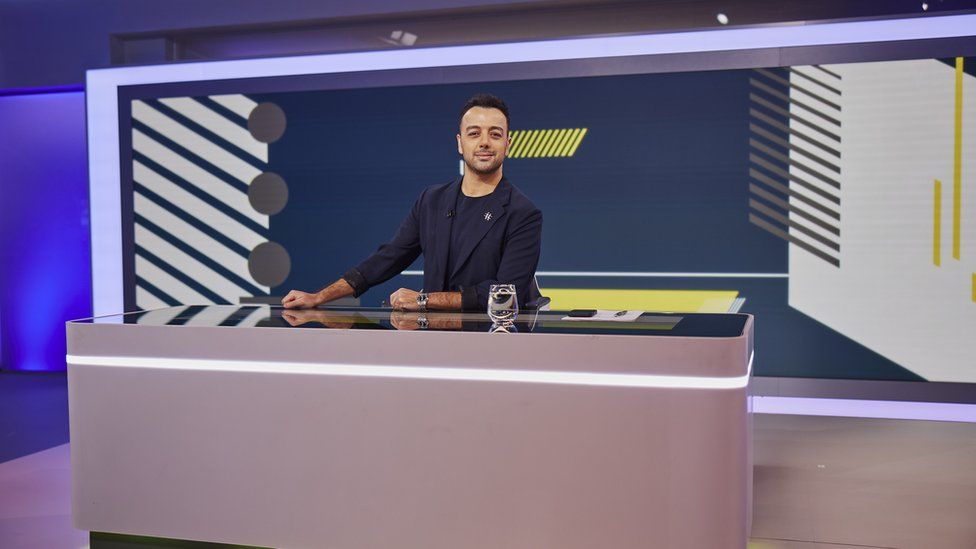
Pouria Zeraati has returned onscreen at Iran International after being stabbed
By Andre Rhoden-Paul
BBC News
The Iran International journalist stabbed in London has told the BBC he is “feeling much better”.
Pouria Zeraati is now back on screen at the London-based Iranian outlet after the stabbing last month.
He told BBC Radio 4’s Today programme he was stabbed by two men as he approached his car.
Mr Zeraati said he also supported Iran’s Islamic Revolutionary Guard Corps (IRGC) being proscribed as a terrorist organisation in the UK.
Speaking with Today’s Mishal Husain, Mr Zeraati said he was recovering physically but “mentally it takes time”.
Describing the attack outside his home in Wimbledon, the 36-year-old said: “On 29 March I was going to my car to get to the studio, and a man approached me. He looked a bit suspicious.
“He pretended to be asking for change, as I was saying, ‘excuse me I don’t have any change’, and I was going to unlock the door, the second man approached.
“They grabbed me from the front, very strong I couldn’t move my hands.
“And the first person stabbed me in my leg, and straight away they ran away and suddenly I just noticed all my belongings are with me, including my mobile phones, my watch, my airpods, my wallet, with cash in it.
“So the moment I saw everything is with me, I noticed this is regarding my job because it wasn’t a robbery.”
Mr Zeraati was taken to hospital and later discharged. He is currently staying in a safe place under police supervision.
Metropolitan Police said both men fled in a vehicle being driven by a third male.
Image source, @pouriazeraati
Pouria Zeraati said recovering mentally from his injuries “takes time”
They travelled to Heathrow Airport shortly after, with police saying the three suspects have left the UK.
Detectives said it was unclear why he was attacked. The investigation is being led by the Metropolitan Police’s Counter Terrorism Command due to previous threats towards Iran International.
In January this year, the Foreign Office announced sanctions against members of IRGC following an ITV investigation into plans to assassinate two of the channel’s presenters in the UK.
The Iranian charge d ‘affaire in the UK, which serves as the head of its diplomatic mission, has denied any link between the Iranian regime and the attack on Mr Zeraati.
Iran International says it provides independent coverage of events in the country, but the regime in Tehran has declared it a terrorist organisation.
Mr Zeraati returned to broadcasting his show on 5 April. “The show must go on,” he said.
The Iran International journalist also said he supported the IRGC being proscribed as a terror organisation, but it was nothing to do with the attack on him.
The IRGC was set up 40 years ago to defend the country’s Islamic system, and to provide a counterweight to the regular armed forces.
One of the most powerful paramilitary groups in the Middle East, the IRGC has become a major military, political and economic force in Iran, with close ties to the Supreme Leader, Ayatollah Ali Khamenei.
It supports militant groups including Hamas and Hezbollah targeting Israel and the Houthis in Yemen which have attacked Red Sea shipping.
The organisation also controls the Iranian government’s foreign covert operations and has previously been linked to kidnap and assassination plots in the UK.
“Killing people outside Iran, taking US, British and European citizens as hostage… it shows they can be considered as a terrorist organisation,” he said.
“The fact that the UK and European Union haven’t decided yet, I think is totally politically motivated.”
Image source, AFP
MPs have called for the IRGC to be proscribed as a terror organisation in the UK
His view is supported by high-profile Conservative MPs, including Suella Braverman and Sir Iain Duncan Smith, and Labour who urged Rishi Sunak in the Commons on Monday to proscribe the IRGC as a terror organisation in the UK following Iran’s attack on Israel.
The move would see the organisation added to a list of banned groups, including Islamists and far-right terrorists.
But Justice Minister Laura Farris said Foreign Secretary Lord Cameron wanted to maintain the ability to speak directly to Iran, which could be jeopardised if the military force was banned.
Former head of MI6 Sir John Sawers told BBC Radio 4’s Today programme he also did not think it was was necessary to ban the IRGC.
“The counter-terrorism legislation was designed to deal with terrorist groups, it’s not designed to deal with states.”








